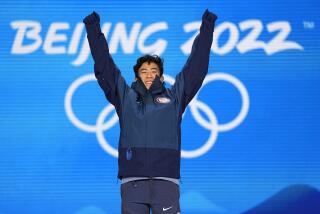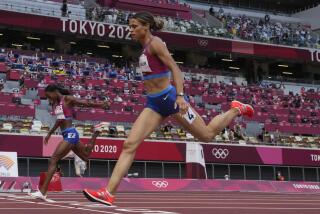El Camino Athlete Competes in Games : Deafness Just Another Hurdle to Be Jumped
It’s no great distance from El Camino College’s Murdock Stadium to Drake Stadium at UCLA. But for deaf sprinter and long jumper Charles Smith, it signifies the leap from junior college track star to potential gold medalist in the 15th World Games for the Deaf that began last week.
In events at Drake continuing through Wednesday, the 19-year-old Smith will be competing in the 100-meter dash, the 200-meter dash, the long jump and a relay event.
The muscular, 5-foot-11 teen-ager had already distinguished himself as a track and field All-American at Las Vegas High School in Nevada when he enrolled at El Camino this past spring.
Though the Torrance college is recognized nationwide for its sign-language curriculum and its program for disabled students, Smith is the school’s only deaf athlete, college officials said.
Olympic Team Finals
And of the more than 200 Americans participating in the international competition for the deaf, Smith is the only one to have qualified for the 1984 U.S. Olympic team finals. He was to have competed in the long jump, but a groin injury kept him out.
“That was disappointing,” he said in sign language translated by Jim Cooney, head coach of the U.S. track team in the World Games for the Deaf. “But in ’88 I’ll be ready!”
Deaf since he was stricken with spinal meningitis at the age of 5 months, Smith has competed against hearing athletes since junior high school.
Last fall he attended the University of Houston on a scholarship. It was a lonely and unhappy experience, he said.
“There were no deaf people there. I was really bored and felt out of place. I stayed only two weeks.
“I wanted to transfer to El Camino,” he continued, adding that his high school coach Martha Watson encouraged him to go. Watson, a former Olympic sprinter and long jumper herself, had once coached at El Camino and at California State University, Dominguez Hills.
‘Opened Doors’
“Charles has really opened doors for deaf athletes here at the school,” said Bob Stuard, head interpreter at El Camino’s Disabled Students Center. “He can be an inspiration to many people as a representative of the deaf culture.”
“He’s very gifted athletically,” said Bill Moreno, assistant track coach at El Camino.
His grades, however, were “just OK,” Smith said. He is transferring next fall to Pasadena City College.
“I couldn’t concentrate” at El Camino, he said. “I was distracted by people and I just couldn’t pay attention in class.”
Outside the classroom, though, Smith hits his stride. Excitement runs high on the U.S. track team about his chances in the long jump and the 100- and 200-meter dashes.
Record Setter
Smith jumped 26 feet, 5 1/2 inches before the Olympic trials, farther than any athlete in previous World Games for the Deaf competition. He has been clocked at 10.54 seconds in the 100-meter dash, beating the record of 10.6 set by a Russian sprinter in the 1973 games. His personal record of 21.25 seconds in the 200-meter dash beats the record set during the 1973 games by a member of the U.S. track team.
The sprinting coach for the U.S. deaf team, Ron Bazil--who is also head track coach at the U.S. Military Academy at West Point--applauds Smith’s dedication to training, which included a recent three-week training camp in Colorado Springs.
“I come from the discipline capital of the world,” Bazil said. “Yet everything we asked Charles to do, he readily did. I think he’s going to set two or three records during the competition.”
While Smith has a clear picture of where he wants to go athletically, he is not so sure about his future.
“After college, I’d like to be a track coach . . . or work for IBM--I don’t know,” Smith said, grinning.
In the meantime, there are medals to be won and expectations to fulfill. “He’s a premiere athlete,” said Bazil. “Among the country’s top deaf track competitors, he’s the best we have.”
More to Read
Go beyond the scoreboard
Get the latest on L.A.'s teams in the daily Sports Report newsletter.
You may occasionally receive promotional content from the Los Angeles Times.





